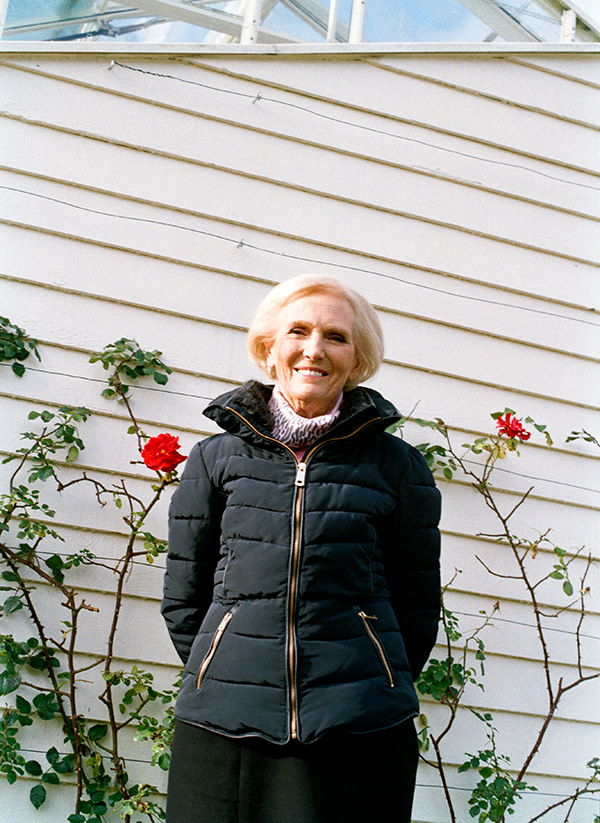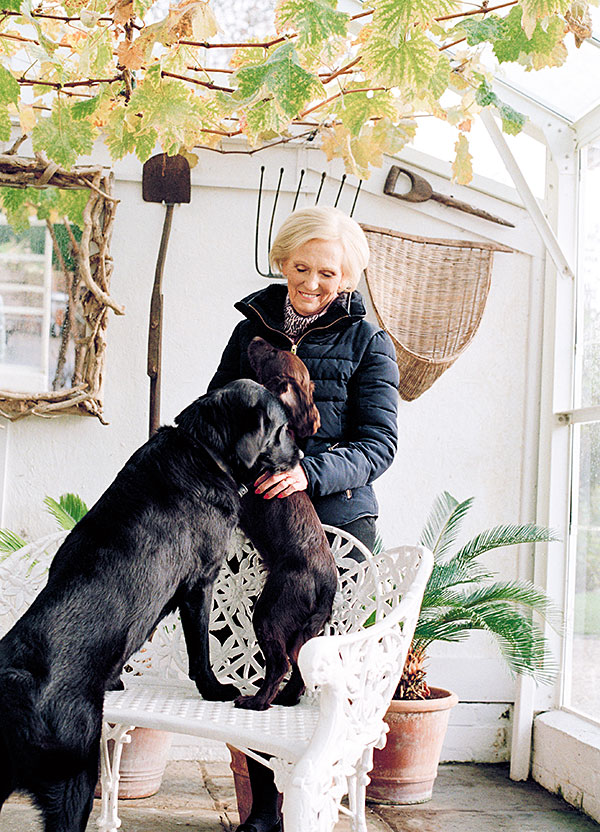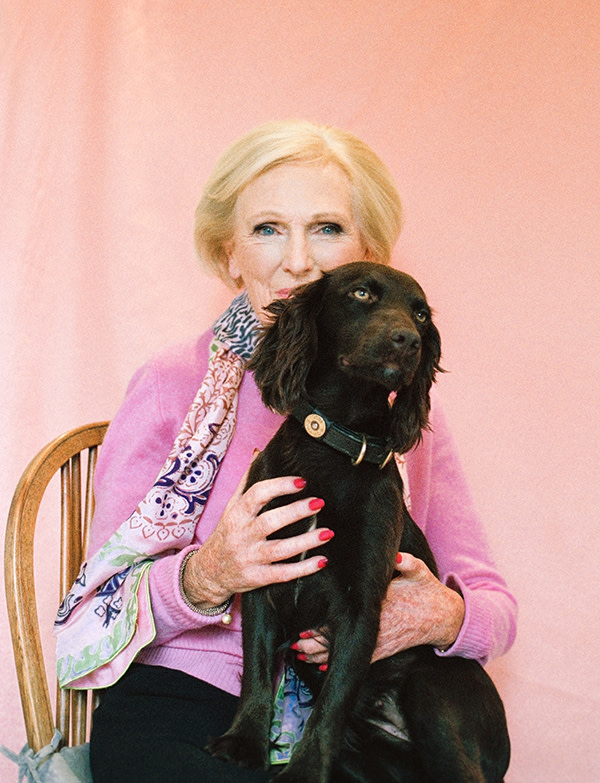Mary Berry: ‘I like to grasp the nettle and get it done’

Simply sign up to the Life & Arts myFT Digest -- delivered directly to your inbox.
It’s late breakfast time, and I’m alone in Mary Berry’s kitchen with her dog Darcey. This winsome little working cocker spaniel sits next to me on a cushioned chair, looking interested in a plate of homemade shortbread on the table, cut into enticing triangles sprinkled with brown sugar.
A navy-blue Aga sits against one wall; 50th wedding anniversary cards congratulating Berry and her husband Paul Hunnings are propped on every surface, in between old envelopes scribbled with to-do lists, awards trophies, fine bone china and pretty bouquets.
Though the room gives off a steady domestic contentedness, it is also the heart of a stunningly successful career. Berry is undisputed queen of the nation’s baking and, aged 81, a broadcaster and author with no plans to slow down (“Gracious no”).
It’s hard to believe the woman who walks into the kitchen, just as Darcey steals a piece of shortbread from the table, is an octogenarian. There is a timeless glamour to her, dressed in pink cashmere sweater with gently frosted pink lipstick to match. She laughs gamely at Darcey’s indiscretion. “Have a biscuit,” she says to me conspiratorially, rubbing the dog’s ears. “I’m going to.”
Berry’s Buckinghamshire home is a beautiful Queen Anne-style house with outbuildings (coach house, greenhouse, sheds), a romantic garden and a lake. We now know her as the Great British Bake Off judge whose admonishment of “soggy bottoms” on ill-cooked cakes won her the love and respect of the programme’s millions of viewers. But Berry and her husband, a retired antiquarian book dealer, bought the property in the late 1980s, by which time Berry was already a bestselling cookery-book author. She has three publishers, Dorling Kindersley, BBC Books and Hachette, and her 80 or so titles have sold a combined six million copies. She also runs a condiments business with her daughter Annabel.
“My mother was 105 [when she died] and played bridge until she was 104,” Berry says, as we settle into her office at the back of the house. “And so I thank everybody for my health, and I’ve got energy. I can be back at 11 o’clock at night and I’ll be up at six in the morning. I am lucky.”
Is there more to it than luck? Berry considers for a moment. “I do plan everything I do. I put my clothes out the night before. I make a list. I had two thank-you letters I had to write last night that I did, though I didn’t feel like it. I have a discipline — I like to grasp the nettle and get it done.”
A certain old-fashioned discipline can’t hurt, but it’s also Berry’s skill as a broadcaster and her rigour as a cookery writer that underpin her professional longevity. Next to her Aga kitchen is a small test kitchen where she and her assistant Lucy Young pummel out recipes for the cookbooks.
Berry and Young used to run an Aga cookery school from the main kitchen, an activity prompted by the tragic loss of Berry’s son William in a car accident in 1989; she has another son, Thomas, a tree surgeon.
“We had a full house here all the time. I started it after we’d lost our son and I wanted to be at home. It was just the natural thing to do, to stay at home. We did it together; I did the morning, Lucy did the afternoon. We gave it up after 12 years when it was absolutely cram-jam full. And it was just after that that Bake Off started.”
. . .

When Berry “got the call” seven years ago from Love Productions, the company that conceived the Great British Bake Off format, she asked herself the two questions that seem to guide her through the many requests for her time and patronage. Would she be good at it, and would she enjoy it?
“One’s asked to do all sorts of things and they don’t always come to fruition. But I thought, ‘baking’: I’ve written The Baking Bible, I’ve written Fast Cakes, I know about baking. I’ve been fortunate to be trained — I had it all behind me. And for once I was not nervous. I thought, ‘Go on, I can do this.’”
Her fellow judge, Paul Hollywood, was hired to cover the show’s breadmaking tasks — a subject on which Berry freely admits her shortcomings. “I’m not a great expert on bread — and I wouldn’t judge a national competition on bread because I’m not skilled. So they said, ‘We’ll have another judge.’” The candidates were brought in.
“There were four to choose from and they said, ‘How do you feel?’ and I said, ‘How do you feel? Who do you think goes well with me?’ And so I was lucky enough to get Paul Hollywood. We’re quite different but I admire him and I know I’m quite different. We’re both professionals and we get there in the end. You do have to have a chemistry when you’re a duo. It was essential we had a bit of a rapport.”
For all the general feel-good bonhomie of the Bake Off tent and its English-summer backdrop, the Mary-and-Paul interactions were occasionally frustrating to watch. “Stop patronising Mary!” was my common refrain to the television.
“For me, I respect him enormously, but I get quite cross . . . I always tried to say something nice [to the contestants]. Whereas Paul would sometimes say, ‘That’s a mess’ — well, if you’ve done something and it looks messy you know, you don’t need to be told. So I would quickly chip in with something nice to encourage them.”
This summer’s seventh series of Bake Off marked the last time the programme would air on the BBC. Love Productions signed a deal with Channel 4 worth £25m a year to take over the format — a sum that was jokily deemed by some commentators to have paid for “a tent”, since Berry and co-presenters Sue Perkins and Mel Giedroyc declined to move, leaving Hollywood as the only surviving cast member.
“The BBC backed it from the beginning,” says Berry. “I feel it was very much a BBC show. And it’s quite nice not to have any adverts. I felt my loyalty was to the BBC, and that’s how Mel and Sue felt.
“A move is different — the whole programme will be different. Paul is brilliant at what he does, he will carry it through. I just wish them well. Often programmes need a bit of a change, and this has got a change.”
Berry has got a change too, with another series of her BBC cookery show next year, and a new programme just announced, in which she will visit and cook with the owners of Britain’s great country houses.
“I had this idea that I’d like to go behind the scenes and find out what goes on at country houses, with the owners — how do they live, do they sometimes cook for themselves, going into their vegetable gardens . . .” There are also rumours of another baking show with Perkins and Giedroyc. Hollywood has his own TV show, City Bakes: “Paul travels a lot and he’s been off around the world, he loves his motoring. I mean he’s 50! He’s got his whole life ahead of him. If I were 50, I’d be doing what he’s doing.”

The success of Bake Off has radiated out to many different people, not just its presenters and victors. It has encouraged a new age of British home baking, and Berry receives letters every week from those who want to explain how it has pulled them through tough patches.
“A lot of [the winners] are doing charitable things or teaching children and setting up cookery schools in their kitchens. Couldn’t be bad, could it?” asks Berry. “I wanted to simplify baking, analyse it, encourage people to bake at home, particularly children. They watch, they have a go and that’s exactly what I wanted. Baking brings the family together.”
Berry’s interests outside the kitchen are led by her friendships (“very important to me”), and she still plays doubles with the same four she’s paired with for years. But should you happen to see her off screen, be warned that there is one aspect of modern life she doesn’t relish. “One of the things I find very difficult is selfies. I went to the Spirit of Christmas [fair] and for once I said to everybody, ‘I’m on a day out with my daughter, do you mind if I don’t?’ And people were absolutely charming . . . What are they going to do? Put it on, what do you call it, Instagram? I think that’s something we could all do without. Surprising the people who ask you.”
Before Berry heads off to her next appointment, she makes some lunch for her husband — disappearing for a minute behind what looks like a giant safe door. It turns out to be a walk-in fridge: she re-emerges from it with some soup to heat up. Then a girlfriend calls, and Berry asks gossipy questions about the friend’s son’s love life.
As I say goodbye, Berry tells me to drive safely. But there’s still no sign of the octogenarian. “It’s very funny, as soon as I go down a step someone puts an arm out, as they think I’m about to fall, but I don’t,” she says defiantly. “I have fun, and I love what I do.”
Natalie Whittle is associate editor of FT Weekend Magazine
Photographs: Lottie Bea Spencer
Comments